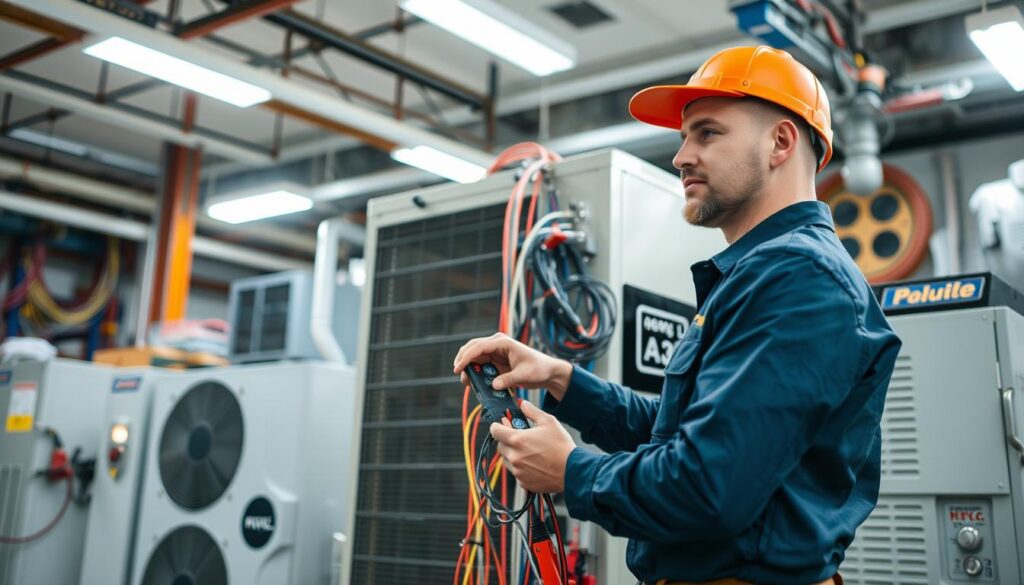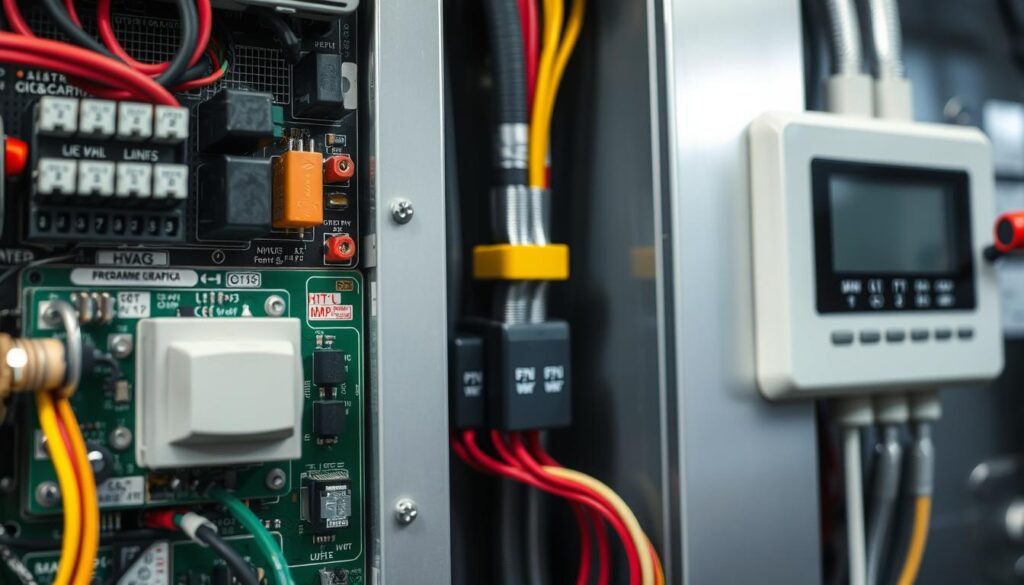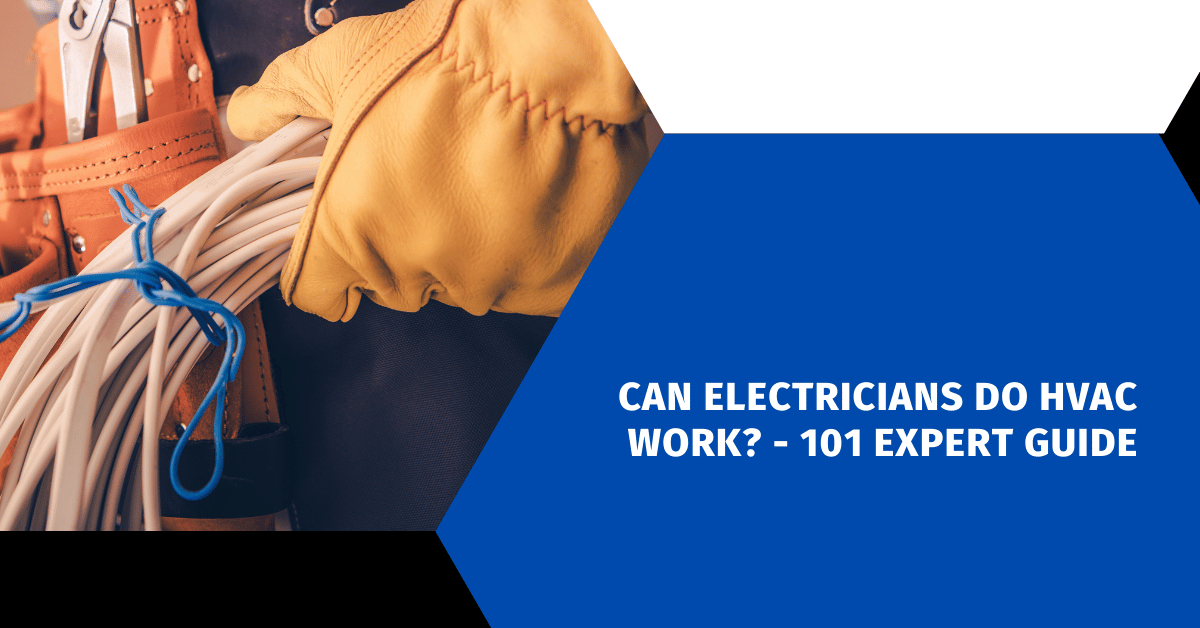Affiliate Disclosure
HVAC Guide Guys is a participant in the Amazon Services LLC Associates Program, an affiliate advertising program designed to provide a means for sites to earn advertising fees by advertising and linking to Amazon.
Can Electricians Do HVAC Work? In today’s world, different trades are mixing more than ever. Homeowners and contractors often wonder: Can electricians handle HVAC work? The answer is yes. Electricians have the skills needed for HVAC systems.

This guide explores the connection between electricians and HVAC work. It covers the key skills, safety rules, and laws that let these pros do well in both areas. If you’re a homeowner or contractor, this guide will help you understand the electrical side of HVAC systems. It’s perfect for making smart choices.
Key Takeaways
- Electricians have the skills and knowledge for HVAC tasks like wiring and troubleshooting.
- The construction world is changing, making it easier for electricians and HVAC techs to work together.
- It’s important for electricians doing HVAC work to have the right licenses and follow safety rules.
- Modern HVAC systems use electrical parts, so electricians and HVAC techs need to work together for the best results.
- Electricians can grow their careers by getting more HVAC training and certifications.
Table of Contents
Understanding the Intersection of Electrical and HVAC Work
Electricity is key to how modern HVAC systems work. Parts like wiring and controls are vital for HVAC equipment. Electricians and HVAC techs often work together. They make sure electrical and mechanical systems work well together.
Role of Electricity in HVAC Systems
HVAC systems need electricity to run. This includes things like furnaces and air conditioners. Smart thermostats use electricity to control and save energy.
As HVAC tech gets better, so does the need for electrical know-how. This includes energy-saving features like variable-speed motors.
Common Overlapping Tasks
- Installing electrical systems, wiring, and lighting fixtures
- Diagnosing and repairing electrical problems in HVAC units
- Interpreting blueprints and technical diagrams to understand the layout of electrical and HVAC systems
- Collaborating to ensure the safe and compliant installation and maintenance of HVAC equipment
Electricians and HVAC techs must work together. This is to keep systems efficient, safe, and up to code. As HVAC tech gets more advanced, the need for skilled professionals grows.
“The future of HVAC systems will likely involve predictive maintenance using AI for optimization and sustainability, further emphasizing the importance of seamless integration between electrical and HVAC expertise.”
The Evolution of Cross-Skilled Trades
The trades industry has changed a lot lately. Now, there’s more focus on cross-skilling among professionals. Before, each trade had its own clear area. But now, people are learning more skills, mixing them together.
This change is good for both the workers and their clients. It opens up more job chances for the workers. They can take on different tasks, making them more flexible and valuable.
For clients, it means they get more for less. They don’t have to deal with many people for one job. This makes things easier and cheaper. It also saves time and money because one person can do it all.
| Benefit | Impact |
|---|---|
| Increased job opportunities | Enhanced employability for multi-skilled professionals |
| Greater convenience for clients | Streamlined project management and reduced coordination efforts |
| Cost-effectiveness | Reduced expenses by relying on a single multi-skilled tradesperson |
| Improved project efficiency | Faster completion times and better overall project outcomes |
The trades industry is always changing. There’s a big need for people who can handle many tasks. By learning to do more, workers can stay ahead and succeed in a fast-changing world.
“The emphasis on energy efficiency and green building practices has led to a growing demand for professionals with HVAC certification who can design, install, and maintain eco-friendly plumbing and HVAC systems in sectors such as residential construction, commercial building management, and government projects.”
Core Competencies of Electricians in HVAC
Electricians in the HVAC field need a strong base in electrical theory and wiring. They must also know about HVAC systems, including refrigeration and heating and cooling. Safety is key, with a focus on OSHA standards and electrical safety.
Technical Skills Required
Electricians in HVAC must have many technical skills. They install, maintain, and fix electrical parts of HVAC systems. This includes reading blueprints, fixing electrical issues, and setting up HVAC systems.
Safety Protocols and Standards
Safety is a big part of HVAC training. Electricians learn to test if electricity is off before starting work. They also follow OSHA standards and use lockout and tag procedures.
HVAC technicians and electricians often work together. They use their skills to make sure HVAC systems work well.
“Electrical safety is paramount in the HVAC industry, and electricians must strictly adhere to OSHA standards and best practices to ensure the safety of themselves and their clients.”
Can Electricians Do HVAC Work?
Absolutely! Electricians can do many HVAC tasks if they have the right training. They focus on electrical systems but also work on HVAC equipment.
Many HVAC systems need electricity to work. So, electricians often install, fix, and maintain these systems. They do this in homes and businesses.
The Bureau of Labor Statistics says HVAC technician jobs will grow by 6% by 2032. They make about $57,424 a year. Electrician jobs will also grow by 6% by 2029, with a median salary of $64,398 in 2024.
But, for complex HVAC jobs, it’s best to get a specialized HVAC technician. Electricians with HVAC training can do a lot, but they might need more help for tricky tasks.
Key Considerations for Electricians Performing HVAC Work
- Proper training and certification in HVAC systems and equipment
- Understanding of HVAC-specific safety protocols and standards
- Familiarity with the latest HVAC technologies and industry best practices
- Ability to diagnose and troubleshoot HVAC system issues
- Compliance with relevant HVAC-related codes and regulations
Electricians can grow their careers by learning HVAC. This skill is valuable in the job market. It helps meet the need for people who can work on different building systems.
Explore Our HVAC Shop
Looking for top-rated HVAC tools, parts, and accessories? Visit our shop and find the perfect solution for your needs.
Visit the ShopEssential Training and Certification Requirements
To be a dual-skilled pro in electrical and HVAC, you need lots of training and certifications. Electricians go through apprenticeship programs and pass tough state licensing exams. For HVAC, you also need special certifications, like the EPA 608 for refrigerants.
Required Licenses and Permits
In many places, like Georgia, electricians need a contractor’s license for HVAC work. The rules change, but often you need 4 years or 8,000 hours of experience, pass a big exam, and keep up with continuing education. For example, Georgia has two licenses for electricians – Class I for low-voltage and Class II for high amperage. Each has its own exam and rules.
Additional HVAC Certifications
- EPA 608 certification for refrigerant handling
- HVAC-specific training programs covering system design, installation, maintenance, and troubleshooting
- Specialized certifications from industry governing authorities to ensure quality standards and market-aligned education
These extra qualifications let electricians handle bigger HVAC jobs and offer more services. By getting into apprenticeship programs, getting the right state licensing, and getting EPA 608 certification and HVAC training, they become valuable in the changing world of building systems.
Explore Our HVAC Shop
Looking for top-rated HVAC tools, parts, and accessories? Visit our shop and find the perfect solution for your needs.
Visit the ShopElectrical Components in Modern HVAC Systems
Modern HVAC systems are complex, using many electrical parts to control the climate. As an electrician, knowing these parts is key to installing, maintaining, and fixing them right.
The control systems are at the center, managing temperature, humidity, and airflow. They use thermostats to keep an eye on the temperature and adjust the system as needed. Circuit boards also play a big role, handling data from sensors and controlling the HVAC’s parts like motors and compressors.
Other important electrical parts in HVAC systems include:
- Motors: They power fans, blowers, and compressors to move air and refrigerant.
- Relays: They manage the timing and flow of electricity to improve system efficiency.
- Capacitors: These store and release energy to keep a steady power supply for the system’s parts.
- Contactors: They control the electricity flow, turning it on or off based on the thermostat’s signals.
Electricians need to understand how these parts work together. Knowing their roles helps in fixing problems, keeping the system running smoothly, and making sure it’s efficient.

| Component | Function |
|---|---|
| Control Systems | Regulate temperature, humidity, and airflow through sensors and actuators |
| Thermostats | Monitor ambient temperature and signal the HVAC unit to adjust accordingly |
| Circuit Boards | Process data from sensors and manage the operation of HVAC components |
| Motors | Power fans, blowers, and compressors to circulate air and refrigerant |
| Relays | Regulate the timing and flow of electrical currents for optimal efficiency |
| Capacitors | Store and release electrical energy to maintain a constant power supply |
| Contactors | Control the electricity flow, turning power on or off based on thermostat signals |
Explore Our HVAC Shop
Looking for top-rated HVAC tools, parts, and accessories? Visit our shop and find the perfect solution for your needs.
Visit the ShopLegal Requirements and Industry Regulations
When electricians do HVAC work, they must follow state rules and codes. They need to stick to building codes, safety rules, and industry standards for both electrical and HVAC jobs. Knowing local laws and getting the right permits is key to being legal and safe.
State-Specific Guidelines
Every state has its own rules for electrical and HVAC work. Electricians must learn these rules to work legally. This includes getting licenses, certifications, permits, and passing inspections.
Code Compliance Standards
Keeping up with codes is vital for HVAC work. Electricians need to know the building codes, safety rules, and industry standards for their projects. This ensures the safety of workers and users of the HVAC systems.
- HVAC systems must provide enough outdoor air as required by the State Building Standards Code, Title 24, Part 2, California Administrative Code.
- The HVAC system should run all day during work hours, except for maintenance, emergency repairs, or when power demand is low.
- Employers must show that the outdoor air supply rate is met, either through air coming in naturally or from nonmechanical systems.
- HVAC systems must be checked at least once a year, with any problems fixed right away.
- Inspections and maintenance of HVAC systems must be documented, including who was involved, when, and what was done.
- These records must be kept for at least five years.
- Employers must let authorized people, employees, or their reps see and copy these records within 48 hours.
By keeping up with building codes, safety regulations, and industry standards, electricians can make sure their HVAC work is legal and follows best practices.
Benefits of Dual Expertise in Electrical and HVAC
Electricians with HVAC knowledge bring a special value to their clients. They can handle both electrical and HVAC systems. This means they can do a wide range of jobs, from simple electrical tasks to complex HVAC setups.
Having both skills can also mean more money. Electricians and HVAC technicians usually earn around $50,000 a year. But those who know both can make up to $144,000 or more, especially in fields like mining.
In South Australia, you can get both certifications in 1,540 hours. This is faster than getting one in 1,060 hours. This quick training makes electricians with HVAC skills stand out and get more jobs.
| Profession | Median Annual Salary | Lowest 10% Earnings | Highest 10% Earnings |
|---|---|---|---|
| Electricians | $60,040 | $37,020 | $99,800 |
| HVAC Technicians | $48,630 | $34,320 | $78,210 |
In Australia, electricians and refrigeration mechanics with dual skills make about $123,609 a year. This is more than what electricians and refrigeration mechanics make separately. It shows the value of knowing both electrical and HVAC systems.
Electricians with HVAC knowledge can offer a comprehensive service. This makes them more marketable and versatile. Their dual skills can lead to higher earnings and more job satisfaction.
Explore Our HVAC Shop
Looking for top-rated HVAC tools, parts, and accessories? Visit our shop and find the perfect solution for your needs.
Visit the ShopCommon Challenges and Solutions
Electricians working on HVAC systems face unique challenges. They need to keep learning and adapt quickly. It’s important to stay current with new technologies in both electrical and HVAC fields.
They also have to navigate complex regulations and follow industry standards. This can be a big challenge.
Technical Obstacles
Electricians must understand the electrical parts of HVAC systems. They need to know about the latest in HVAC control systems, refrigerants, and energy-saving tech. Continuous learning and professional growth are key to solving electrical issues in HVAC.
Regulatory Hurdles
The HVAC world is full of rules and safety standards that change by location. Electricians working on HVAC need to know about licenses, permits, and codes in their area. Joining professional groups helps them keep up with new rules and best practices.
To tackle these issues, electricians must be open to continuous learning. They should take special training, get certifications, and go to industry events. This way, they can handle new tech and rules well. By being proactive, they can offer complete solutions to their clients, making HVAC systems work smoothly.

Career Opportunities for Cross-Skilled Professionals
As more buildings need to be energy-efficient and smart, electricians with HVAC skills are in high demand. They can work in many sectors because they know how to handle both electrical and HVAC systems. This makes them very valuable in the job market.
Facilities management is a great place for these electricians to shine. They can manage the upkeep and improvement of building systems. They ensure that electrical and HVAC parts work well together. They’re also good at helping places use less energy and save money.
Another area where they can excel is in HVAC-electrical integration projects. These projects need people who can design, install, and fix systems that use both electrical and HVAC tech. This includes smart homes, energy management systems, and green energy solutions.
| Career Opportunities for Cross-Skilled Professionals | Job Market Demand | Career Advancement | Specialized Roles |
|---|---|---|---|
| Facilities Management | Growing demand for energy-efficient and smart building systems | Increased responsibilities in overseeing maintenance, repair, and optimization of building systems | Electrical and HVAC system integration, energy efficiency consulting |
| Energy Efficiency Consulting | Businesses and homeowners seeking to reduce energy costs and improve sustainability | Opportunity to advise on energy-saving measures and implement advanced building technologies | Specialized expertise in energy auditing, building performance analysis, and sustainable energy solutions |
| HVAC-Electrical Integration Projects | Increasing adoption of smart home automation, energy management systems, and sustainable energy solutions | Advancement in designing, installing, and troubleshooting advanced building systems | Specialized skills in integrating electrical and HVAC technologies, programming, and system optimization |
The push for energy efficiency and smart buildings opens up many doors for electricians with HVAC skills. They can use their knowledge of both electrical and HVAC systems to find new jobs, grow their careers, and take on special roles. This helps in making modern buildings better and more efficient.
Explore Our HVAC Shop
Looking for top-rated HVAC tools, parts, and accessories? Visit our shop and find the perfect solution for your needs.
Visit the ShopBest Practices for Electricians Working on HVAC Systems
As an electrician working on HVAC systems, safety is key. You must also focus on quality and keep learning. Following industry standards helps ensure HVAC systems work well and safely.
Rigorous Safety Protocols
Electrical accidents in the U.S. cause about 1,000 deaths yearly. Faulty HVAC work can lead to fires and damage. To avoid these, always follow strict safety rules, like:
- Wearing the right personal protective equipment (PPE), including insulated gloves, face shields, and safety glasses
- Using only insulated tools and equipment
- Checking circuit energy status before working on HVAC components
- Adhering to OSHA’s electrical safety standards and the National Electric Code
Continuous Professional Development
It’s vital to stay updated with the latest in HVAC. Regular training and working with HVAC experts are key. This way, you can offer top-notch service and keep HVAC systems safe and efficient.
Maintaining Quality Assurance
Quality is crucial when working on HVAC systems. Always document your work, follow manufacturer guidelines, and inspect regularly. This ensures your work is reliable, preventing failures and safety risks. It also helps you build a strong reputation as a trusted HVAC electrician.
Following safety rules, learning continuously, and focusing on quality are essential for HVAC electricians. These practices help ensure HVAC systems operate safely and efficiently. They also boost your career and gain client trust.
Conclusion
The trend of combining electrical and HVAC skills is growing in the trades industry. It brings many benefits for both professionals and clients. Electricians can do HVAC work with the right training and certification.
This allows them to grow their skills and offer more services. Despite challenges, the chance for professional growth and more services makes cross-skilled trades appealing. It helps electricians stay ahead in the changing job market.
The electrical-HVAC integration shows the industry’s ability to adapt. It meets the need for tradespeople who can do many things. By learning and getting certified, electricians can connect electrical and HVAC systems.
This makes them valuable to clients and employers. It also improves job chances and creates a better work environment.
As the trades industry keeps changing, knowing both electrical and HVAC will be key. Electricians who take on this challenge can stand out. They can offer more services and help the industry grow.
By keeping up with training, getting certifications, and improving their skills, electricians can meet the demand for cross-skilled trades. This way, they can have lasting success in their careers.

